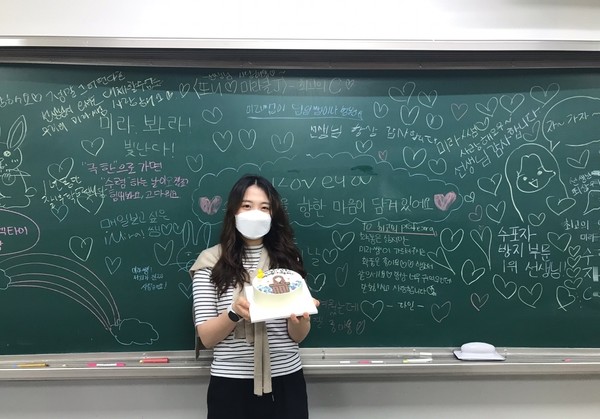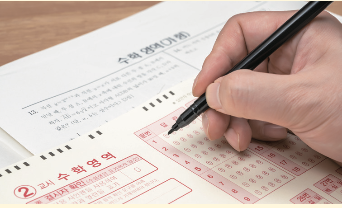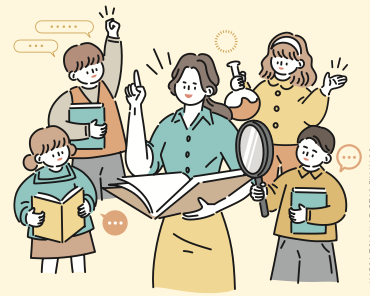Daily life as a high school teacher in South Korea
IT IS no overstatement to claim that the importance of the role of an educator is fundamental in society. Beyond facilitating intellectual development, teachers serve as influential supporters for their students, providing lifelong lessons. They play pivotal role in shaping our future society, nurturing students to grow into virtuous, right-minded citizens. Attempting to take a glimpse into the world of high-school teachers in South Korea, The Yonsei Annals interviewed Jeong Mi-ra, a teacher of mathematics at Cheongju Foreign Language High School.

Annals: What are the steps necessary to become a high school teacher in South Korea?
Jeong: There are three ways to become a high school teacher in South Korea, and the most common way is to major in a college of education. After graduating from a college of education anywhere in South Korea, you would automatically receive the certificate of Secondary School Teacher (GradeⅡ). Subsequently, you must apply for the Civil Service Examination, which is divided into four categories; 'Public Schools Only', 'Simultaneous Application to Public and Private Schools', 'Private Schools Only', and 'Multiple Applications to Private Schools'. Keep in mind that the process of applying for the Civil Service Examination has changed in 2021 compared to past, where the exam was not necessary to become a private high school teacher.
Annals: As there is no College of Education at Yonsei University, how can Yonsei students become a high-school teacher in South Korea?
Jeong: For those who are not enrolled in a college of education, you must complete the Teacher Certificate program in order to receive the certificate of Secondary School Teacher (GradeⅡ). Especially at Yonsei University, if you are in the Department of Education major or the Department of Physical Education, you must apply for the Teacher Certificate program during your fourth semester. Once you obtain a teacher’s certificate, applying for the Civil Service Exam is a must to become a high school teacher.
If you have already graduated from any other majors and do not satisfy any of the two aforementioned requisites, then you have one last option. You can graduate from a Graduate School of Education, where you can receive the certificate of Secondary School Teacher (GradeⅡ). Upon receiving the teacher’s certificate, you need to apply for the Civil Service Exam to be employed as a high school teacher.
Annals: What inspired you to become a high school teacher?
Jeong: Since I was an elementary school student, I have always been interested in teaching. Ever since my fifth-grade homeroom teacher recommended that I specialize in mathematics, I began to dream of becoming a math teacher.
Annals: Can you describe your teaching style?
Jeong: Since math taught at the high school level involves a variety of question patterns and formulas one must comprehend, I believe that communicating with students is essential to grasp their level of understanding. I usually try to interact with my students, ask questions, and point out the type of questions they usually get wrong. Also, I try to motivate them at the first stage, making the students study voluntarily rather than through coercion.

Annals: Were there any unexpected realities that exceeded your initial expectations?
Jeong: Starting my career at 24, I was worried about whether I could exhibit my leadership as a teacher and foster a structured, flexible learning environment. Looking at students who misbehave and offend their teachers, just as the media portrays, made me a bit nervous at first. But much to my surprise, there have also been many adorable students who made my past eight years of teaching a pleasure, allowing me to work comfortably in a warm-hearted manner yet with a firm position if necessary.
One other surprise was the way students and teachers communicate these days. Today, students and teachers freely text each other; students even leave comments on teachers’ SNS accounts. We students in the past were usually scolded by our teachers if we texted them instead of politely making a phone call.
Annals: Were there any difficulties or challenges working as a high-school teacher? If so, how did you overcome them?
Jeong: Interestingly, out of my eight years as a high school teacher, I have spent six years teaching high school seniors. At times, I was required to confront situations where I had to point out their weaknesses and encourage their growth, even if it meant being stern. Although I am not a sentimental person, I found myself increasingly weighed down by feelings of guilt. As students at that stage are solely focused on preparing for the Korean SAT and gaining admission to a prestigious university, q lack of close relationships with students left a lot to be desired. To handle my guilt, I tried to spend time with the students even during recess, making students understand that my harsh instructions were rooted in genuine interest and love towards them. Especially in the second semester of the year when I could adjust my time flexibly, I approached students in a friendly manner. Gratefully, that strengthened the bond between the students and me and allowed students to share underlying emotions honestly.
Annals: What is your ultimate life goal?
Jeong: I have long considered receiving thank you notes from students and their families as the most rewarding experience I could attain as a teacher. However, recently I have found myself questioning whether I have achieved authentic self-growth. Concluding that cultivating self-development is as valuable as enriching the kids’ growth, I have started attending graduate school to study AI and take various courses. Although I have not decided on a specific future goal yet, I believe that as I continue to build expertise, I will become a memorable educator to my students, as well as a person I myself can be satisfied with.
Annals: How do you handle stress?
Jeong: Actually, I do not usually find myself stressed out. But still, I love engaging in various physical activities such as fitness, water skiing, swimming, golf, etc. I also travel abroad at least once a year, adding vibrant experiences to my everyday life while experiencing diverse cultures.
Annals: Are there any essential qualities needed as a high school teacher?
Jeong: There are a lot of crucial qualities required as a high school teacher. Possessing a broad and deep knowledge of the subjects, a high level of morality and generosity, and a genuine interest in neighbors and worldwide society are all necessary. Among all of these, as it is inevitable that there are a few students who misbehave, I believe that having a positive mindset to love your students is as essential as having captivating teaching skills.

Annals: What type of students do you prefer?
Jeong: Earlier when I first started to work, I preferred students who took ownership of their own actions and were dedicated to their responsibilities and goals. Now, I like students who possess positive mindsets and are confident in their abilities. By relating with them, I can receive positive and vital energy from them, which functions like nutrients for my growth.
Annals: Do you recommend being a high school teacher in South Korea?
Jeong: It depends on one’s personality. In my case, I am a passionate person, yet not ambitious. If you are a person who values financial compensation highly, then being a teacher would not fit you well. You might also feel bored with the repetitive tasks given day by day. I have seen many introverted colleagues who are stressed out each year when the designated students change and some teachers who do not feel strong in writing suffer when they must focus on writing students’ report cards individually. But if you are not someone with these personalities, the pleasure of enriching students’ memories each year and mentoring a young and fresh spirit would fascinate you.
Annals: Do you have any messages or pieces of advice that you would like to convey to potential high school teachers among the readers of The Yonsei Annals?
Jeong: Although teachers’ educational authority has faced considerable infringement in recent years, many teachers are driven by a genuine belief in the potential of education to transform society for the better by nurturing future leaders. You, future teachers, are the ones who brighten school environments despite difficult times. I look forward to meeting you as fellow educators and contributing to the enrichment of the education sector. We are rooting for you!

